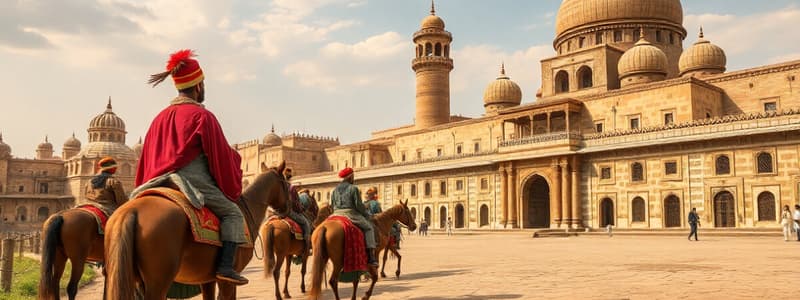Podcast
Questions and Answers
What was one of the implications of Marco Polo's travels for Europe during the Middle Ages?
What was one of the implications of Marco Polo's travels for Europe during the Middle Ages?
Who were Marco Polo's family members that influenced his journey to China?
Who were Marco Polo's family members that influenced his journey to China?
What type of literature is The Travels of Marco Polo considered?
What type of literature is The Travels of Marco Polo considered?
What notable aspect of Kublai Khan’s rule is described by Marco Polo?
What notable aspect of Kublai Khan’s rule is described by Marco Polo?
Signup and view all the answers
Why were some readers skeptical of Marco Polo's accounts?
Why were some readers skeptical of Marco Polo's accounts?
Signup and view all the answers
What was one of the advancements of the Mongol Empire during Marco Polo's travels?
What was one of the advancements of the Mongol Empire during Marco Polo's travels?
Signup and view all the answers
What criticism do modern scholars have regarding Marco Polo's writings?
What criticism do modern scholars have regarding Marco Polo's writings?
Signup and view all the answers
What was Kublai Khan's approach to different cultures within his empire?
What was Kublai Khan's approach to different cultures within his empire?
Signup and view all the answers
Study Notes
Marco Polo
- Marco Polo was a 13th-century Venetian merchant who extensively traveled in Asia for over 20 years.
- His travels introduced Europeans to the Far East, a period when Europe was politically and geographically fragmented.
- Venice was a western Silk Road city, a network connecting Europe to China.
- Marco Polo's father and uncle, Niccolò and Maffeo, were merchants who made fortunes on the Silk Road trade.
- They journeyed to China, meeting Kublai Khan, the Mongol Empire's ruler.
- Kublai Khan requested the Polos to bring European scholars.
- Marco Polo accompanied his father and uncle on a 24-year journey to Asia.
- Marco Polo penned The Travels of Marco Polo, detailing his Asian experiences.
- Rustichello, a writer, co-authored the book, adding fictional elements for entertainment.
- Polo's travels revealed exotic animals (tigers, crocodiles, rhinoceroses) unknown or rare in Europe.
- He described Kublai Khan's extravagant lifestyle: 12,000 knights guarded his palace, receiving daily treasure tributes.
- Kublai Khan assigned Polo exploratory missions, revealing details about the vast and varied Mongol Empire.
- Kublai Khan fostered religious tolerance, allowing subjects to practice their religions freely.
- The Mongol Empire was advanced: heated rocks for heating, hot baths, and a paper-money system centuries before Europe's.
- Polo's accounts were doubted by many Europeans, who considered Europe superior.
- Modern scholars doubt Polo's accuracy, citing missing Chinese cultural elements (tea, chopsticks) in his writing.
- Historians believe The Travels were composites of fact and fiction, with exaggerated, borrowed elements.
- The Mongol Empire declined after Kublai Khan's death, and its Silk Road trade routes collapsed.
- The Silk Road's demise prompted the Age of Exploration, driving European search for new sea routes to Asian goods.
- Polo's narratives inspired European explorers, including Christopher Columbus.
Studying That Suits You
Use AI to generate personalized quizzes and flashcards to suit your learning preferences.
Description
Explore the fascinating journey of Marco Polo, a Venetian merchant whose extensive travels in Asia brought back knowledge of the Far East to Europe. Learn about his interactions with Kublai Khan, the exotic animals he encountered, and the collaborative writing of The Travels of Marco Polo. This quiz covers key aspects of Polo's impact on trade and cultural exchange during the 13th century.




